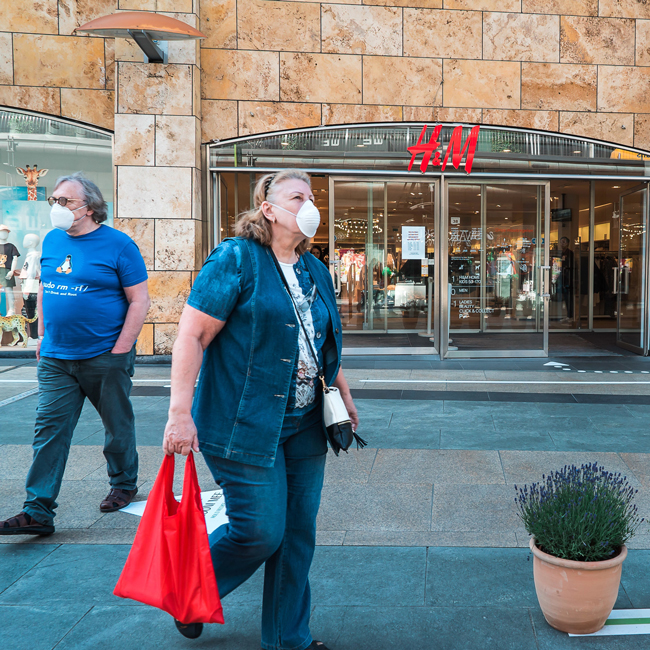Market logic can’t survive a pandemic

Market logic can’t survive a pandemic
Opinion + AnalysisBusiness + Leadership
BY Dr Richard Denniss 8 DEC 2020
For decades, neoliberalism has fuelled enormous scepticism about the role of government.
Whereas the ‘invisible hand’ of market forces is used as a synonym for efficiency and progress, the ‘dead hand’ of bureaucracy congers up waste and delay. But after decades of bad press, the Covid-19 pandemic seems to be restoring Australia’s faith in government.
Almost nobody, in Australia at least, trusts the market to solve a pandemic. Over the past 10 months, Australians have assumed that their elected representatives, and the bureaucracies they oversee, will solve all manner of problems on our behalf. And, by and large, the Australian public’s faith in government has been well placed.
It was the federal government, not the travel industry, that suddenly closed our international borders on March 2020 to slow the spread of the virus into Australia. It was the state premiers who closed our state borders to slow the spread within Australia. And, via the formation of the National Cabinet, our state and national leaders have delivered clearer messages, simpler rules, and more effective policies than almost any other government in the world.
Needless to say, mistakes were made. Passengers should not have disembarked from the Ruby Princess, Melbourne’s hotel quarantine system should have been better, aged care homes should have been provided with better information and more support, and the tracing app developed by the federal health department has been a waste of time and money.
But, despite the mistakes, Australia is largely virus-free with an economy that is starting to grow again. And trust in Australian political leaders has risen to record levels. State premiers, in particular, have surged in popularity as they stepped in to protect their residents.
Nobody thinks that ‘market forces’ could have done a better job of protecting Australians from Covid-19. Indeed, the sharpest criticism from the Coalition of Daniel Andrews is that he relied too heavily on private security guards and didn’t rely heavily enough on the Commonwealth’s offer to provide troops to guard the hotels. Think about that. Daniel Andrews is being criticised for not relying on the public sector enough!
When a vaccine finally arrives, how will we decide who gets it first? Will we ‘leave it to the market’ and let drug companies set whatever price they want or will we develop clear (bureaucratic) rules for which vulnerable groups and key workers will get it first at zero price?
Governments aren’t perfect, and neither are markets. We have always relied heavily on governments to provide health, education and transport infrastructure and we have always relied heavily on markets to provide food, clothing and entertainment. Different countries, at different points in time, make different choices about how and when to rely on the government, with voters ultimately having the final say.
While it is clear that the Covid-19 pandemic will have a lasting impact on Australia’s economy, society and democracy, what is not clear is what shape that impact will be. Will we wind back the deregulation of our privatised aged care system that led to the untimely death of so many vulnerable Australians? Will we invest more heavily in public health? Will we expand and modernise our public transport system to make it less crowded? Or will we just go back to cutting taxes and cutting spending on services?
The economic language of neoliberalism has had a profound impact on our public debates, our public institutions, and perhaps most importantly, our collective expectations of what governments can and can’t do.
But as any Australian who has watched the enormous death toll and economic destruction taking place in the US and much of Europe can see, the Covid-19 pandemic has made it clear that government intervention, political leadership and a strong sense of community are essential for addressing some problems.
It’s not inevitable that Australians will translate their new-found faith in governments into support for more government action on issues like climate change, inequality or the liveability of our cities. But it’s not impossible.
After decades of hearing that governments are the problem, Australians have just seen for themselves how effective governments can sometimes be.
Despite the Covid-19 crisis, Australia is one of the richest countries in the world, and while we can afford to do anything we want, we can’t afford to do everything we want.
Neoliberal rhetoric about the inherent inefficiency of government action has for decades stifled debate about which problems we would like the government to fix and which problems we are happy to leave to the market. But the new reality is that everyone agrees that governments have an important role to play in solving big problems.
Should we have a ‘gas fired recovery’ or a ‘green new deal’. Should we invest heavily in public housing or provide tax breaks for individual property investors? While it shouldn’t have taken a pandemic to provide it, at least we finally have room in our public debate to ask such questions.
This project is supported by the Copyright Agency’s Cultural Fund.
![]()
Ethics in your inbox.
Get the latest inspiration, intelligence, events & more.
By signing up you agree to our privacy policy
You might be interested in…
Explainer
Business + Leadership
Ethics Explainer: Ethical Infrastructure
Opinion + Analysis
Business + Leadership, Politics + Human Rights, Society + Culture
Corruption, decency and probity advice
Opinion + Analysis
Business + Leadership
The anti-diversity brigade is ruled by fear
Opinion + Analysis
Business + Leadership
Susan Lloyd-Hurwitz on diversity and urban sustainability
BY Dr Richard Denniss
Dr Ricahrd Denniss is Chief economist and former Executive Director of the Australia Institute. Richard is a prominent Australian economist, author and public policy commentator, and has spent the last twenty years moving between policy-focused roles in academia, federal politics and think-tanks. He was also a Lecturer in Economics at the university of Newcastle and former Associate Professor in the Crawford School of Public Policy at ANU. He is a regular contributor to The Monthly and the author of several books including: Econobabble, Curing Affluenza and Dead Right: How Neoliberalism Ate Itself and What Comes Next?
Treating citizens as customers is a recipe for distrust

Treating citizens as customers is a recipe for distrust
Opinion + AnalysisBusiness + LeadershipRelationships
BY Eva Cox 8 DEC 2020
My 1995 ABC Boyer Lectures, ‘A Truly Civil Society’, outlined the ill effects of the then decade-plus political paradigm shift to neoliberalism.
In the years following WW2, governments implemented policy changes to ensure well-functioning societies that delivered social fairness. This was to avoid a repetition of the pre-war rise of dictatorships, such as happened in Germany and Italy where democracies were overthrown by the fascists. Much of this reconstruction included expanding health, education and welfare for communities to balance the existing inequities of market wealth creation.
From the 1980s, the failing USSR and the globalising of finance via petrodollars allowed big business to shift the paradigm to market forces and reduce the scope of governments. The effects were becoming evident while I was writing the Boyer’s in 1995, as neoliberalism was exacerbating the cuts to social goals and public funding. Growing distrust of democracy was also becoming apparent in many countries, including Australia.
Now, twenty-five years of policy shifts later, including a market-created Global Financial Crisis in 2008, these changes continue to have ill-effects on democratic governance and trust. Policies such as unfair distributions of taxes that favour businesses and the better-off have exacerbated this, as has the privatising of public services and public ownership of utilities and institutions. The promise that the private model of competition and wealth creation would create trickle-down wealth failed to eventuate. Nor did we see any sign of the market lowering prices for these services, as is promised by this model. Citizens, redefined now as just customers of what were once public services, have not found the market more efficient or effective.
Prioritising growth and profits over community needs and connections exacerbates distrust of those in power.
Finding jobs becomes more difficult as growth slows, and low wages remain for many of the often-feminised essential services, such as nursing and child care. The new gig-economy has also increased feelings of insecurity. Ergo, it has not been surprising that over the last decades there have been growing feelings amongst many people in democracies, including Australia, that those in power are not to be trusted.
Now that the neoliberal paradigm shift is obviously failing, we need to devise and define alternatives. The failure has created a fertile ground for the increasingly irrational ‘strong men’ leaders to grab power. These strong men undermine the idea of democracy and surge in on a wave of distrust. We now have in Australia, as elsewhere, increasing beliefs that society is unfair, feelings of real anger and despair, and a deep distrust of the political system. It is this unfairness that is the damaging cause of most of our problems.
The range of inequities in our current system include politics and policies that respond mainly to business demands and neglect community needs. The recent budget is a good example, where subsidies were available to incentivise businesses to hire more people, even if there were too few customers. Yet much-needed jobs in community and public spheres were barely mentioned.
We need changes that create a sense of fairness by providing good social and public services. People need to feel that they live in societies where they and their contributions are valued and their voice matters. We are social beings, connected, and need to feel safe and involved.
Assuming wealth inequality is a causal factor fails to recognise the real causes: self-interested economic goals that ignore and exclude the values of fairness and trust that are necessary to create a truly civil society.
The national cabinet’s response to the pandemic, an effective public health collaboration, reminded people what good governance looks like. Consequently, it has improved the levels of voter trust. There are now signs of reversal as the PM reverts to a private sector, economic-led recovery.
Now it’s up to us. We need policies that set social goals, fix environmental damage, and create fairness and long-term well-being. Here are some radical ideas: stop privatising community services and utilities, fix the messy unfair welfare system (perhaps introduce a universal social dividend), engage communities in planning for their needs, reform the tax system so that it’s fairer in the redistribution of resources, pass the Uluru Statement from the Heart. This way, everybody should get a fair go.
Outrageous ideas? Maybe, but replacing greed and self interest with fairness requires optimism and another paradigm shift!
This project is supported by the Copyright Agency’s Cultural Fund.
![]()
Ethics in your inbox.
Get the latest inspiration, intelligence, events & more.
By signing up you agree to our privacy policy
You might be interested in…
Opinion + Analysis
Business + Leadership
Businesses can’t afford not to be good
Opinion + Analysis
Relationships, Science + Technology
The complex ethics of online memes
Opinion + Analysis
Business + Leadership
Ethics in engineering makes good foundations
Opinion + Analysis
Relationships










